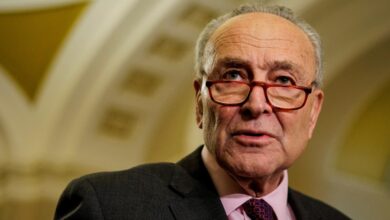
US Military Readiness Under Scrutiny After Aerial Incursions
US military readiness under scrutiny after aerial incursions has become a topic of intense debate. Recent incidents involving unauthorized aircraft entering US airspace have raised serious questions about the effectiveness of our nation’s defenses. These incursions, whether intentional or accidental, have sparked concerns about potential vulnerabilities and highlighted the need for a comprehensive reassessment of our military capabilities.
The recent incidents have not only raised concerns about US military readiness but have also ignited discussions about the potential implications for US national security. Some experts argue that these incursions represent a growing challenge to US dominance in the region, while others believe that they are simply isolated events that do not necessarily indicate a broader decline in US military strength.
Recent Aerial Incursions and Their Impact
Recent aerial incursions by foreign aircraft into US airspace have sparked widespread concerns about US military readiness and the effectiveness of its air defense systems. These incidents, while not necessarily signifying a direct threat, have raised questions about the US military’s ability to respond swiftly and decisively to potential adversaries.
The Specific Aerial Incursions
These incidents involve unauthorized flights by foreign aircraft, primarily from Russia and China, into US airspace or the airspace of its allies. These incursions are often characterized by their proximity to sensitive military installations or strategically important locations. For instance, in 2021, a Russian bomber aircraft flew within 50 miles of Alaska’s coast, prompting a scramble by US fighter jets.
Similarly, Chinese fighter jets have been observed flying near Taiwan, a self-governing island claimed by China. These incidents have been viewed as deliberate provocations designed to test US defenses and demonstrate their military capabilities.
Motives Behind the Incursions
The motives behind these aerial incursions are multifaceted. Some analysts believe that these actions are intended to demonstrate a growing military assertiveness by Russia and China, challenging US dominance in the region. Others argue that these incursions are part of a broader strategy to test US military capabilities and gauge its response time.Moreover, these incursions can be seen as a form of psychological warfare, aimed at creating a sense of unease and uncertainty among US allies and the general public.
Impact on Public Perception
These aerial incursions have had a significant impact on public perception of US military capabilities. Some individuals have expressed concern about the US military’s ability to defend its airspace and respond effectively to potential threats. This perception has been further fueled by reports of equipment malfunctions and personnel shortages within the US military.However, it is important to note that these incidents are not necessarily indicative of a widespread decline in US military readiness.
The US military remains one of the most powerful and technologically advanced in the world, capable of defending its interests and allies. Nevertheless, these aerial incursions have highlighted the need for continuous modernization and improvement of US military capabilities to effectively address emerging threats.
Examining US Military Readiness

The recent aerial incursions have raised concerns about the US military’s readiness to respond to evolving threats. While the US boasts a powerful and sophisticated military, questions remain about its ability to effectively project force and defend national interests in a rapidly changing global landscape.
This section delves into key areas of US military readiness that are under scrutiny, analyzes its strengths and weaknesses, and provides examples of recent military exercises and deployments that showcase its capabilities.
Personnel Readiness
Personnel readiness is a crucial aspect of military preparedness. It encompasses the quality, training, and morale of military personnel. The US military relies on a large and diverse force, but challenges persist in attracting and retaining qualified personnel.
The recent aerial incursions have sparked a debate about US military readiness, but it seems the focus is shifting. While our military capabilities are being scrutinized, a separate, more immediate crisis is unfolding: the political maneuvering surrounding the recent arrival of busloads of illegal aliens sent to Kamala Harris’s home on Christmas Eve.
This event highlights a different kind of vulnerability, one that demands our attention and calls into question our national priorities. Amidst the concerns about military preparedness, it’s crucial to address the immediate needs of those who are most vulnerable, particularly those who have crossed our borders seeking refuge.
- One concern is the shrinking pool of eligible recruits, particularly those with the necessary skills and education.
- Another issue is the increasing demand for specialized skills in cyber warfare, space operations, and artificial intelligence, requiring extensive training and experience.
- Furthermore, maintaining morale and combat readiness among troops facing long deployments and demanding operational environments is essential.
Equipment Readiness
The US military possesses an impressive array of advanced equipment, including aircraft, ships, tanks, and weapons systems. However, maintaining the readiness of this equipment is a significant challenge.
- The aging fleet of aircraft and ships requires extensive maintenance and upgrades, placing a strain on resources and potentially impacting operational availability.
- Furthermore, the rapid pace of technological advancements necessitates continuous investment in research and development to maintain a competitive edge.
- The US military faces challenges in procuring and deploying new technologies, particularly in areas such as hypersonic weapons, artificial intelligence, and space-based capabilities.
Training Readiness
Training is fundamental to military readiness, ensuring that personnel are proficient in their roles and can operate effectively as a cohesive unit.
The recent aerial incursions have put the US military’s readiness under a microscope, prompting concerns about our ability to respond effectively. But it’s not just about our own defense; global economic trends are also impacting our preparedness. The news that declining US retail sales are weakening Chinese export growth has significant implications for the global supply chain, potentially impacting our access to critical resources needed for military operations.
- The US military conducts a wide range of exercises and training scenarios to enhance operational capabilities.
- However, the increasing complexity of modern warfare requires training that simulates real-world scenarios, incorporating advanced technologies and evolving tactics.
- The US military is continuously adapting its training programs to meet these challenges, focusing on joint operations, interoperability with allies, and counter-insurgency tactics.
Recent Military Exercises and Deployments
The US military participates in numerous exercises and deployments worldwide to demonstrate its readiness and deter potential adversaries.
- For instance, the annual Rim of the Pacific (RIMPAC) exercise, held in the Pacific Ocean, involves navies from over 20 countries and showcases the US military’s ability to conduct large-scale operations.
- The US military also deploys troops and equipment to various regions, including the Middle East, Europe, and the Indo-Pacific, to maintain a presence and deter aggression.
- These exercises and deployments provide valuable training opportunities and demonstrate the US military’s commitment to global security.
Addressing Concerns and Strengthening Readiness

The recent aerial incursions have highlighted the need for the US government to address concerns about military readiness. While the US military remains the most powerful in the world, there are areas where improvements are necessary to ensure it can effectively meet current and future challenges.
Steps Taken to Address Concerns
The US government is taking several steps to address concerns about military readiness. These include:
- Increased Funding:The Biden administration has proposed a significant increase in defense spending for the 2023 fiscal year, with a focus on modernizing the military and improving readiness. The increased funding aims to address areas like modernization of weapons systems, recruitment and retention of personnel, and enhanced training exercises.
- Modernization of Weapons Systems:The Pentagon is investing heavily in modernizing its weapons systems, including developing new hypersonic missiles, advanced drones, and artificial intelligence capabilities. These investments are crucial for maintaining a technological edge over potential adversaries.
- Focus on Joint Operations:The US military is emphasizing joint operations, which involve the coordinated efforts of different branches of the armed forces. This is essential for effectively responding to complex threats that require a multi-faceted approach.
- Improved Training and Exercises:The military is increasing the frequency and intensity of training exercises, both domestically and internationally. These exercises help to improve unit cohesion, enhance operational skills, and test new equipment and tactics.
Impact of Budget Cuts and Defense Policy Changes, Us military readiness under scrutiny after aerial incursions
Budget cuts and defense policy changes can have a significant impact on US military readiness. For example, the 2011 Budget Control Act led to significant reductions in defense spending, which forced the military to make difficult choices about what programs to cut.
The recent aerial incursions have brought the US military’s readiness under intense scrutiny, prompting debates about resource allocation and strategic preparedness. Meanwhile, on a different front, longtime Democrat senator announces she wont seek another term , leaving a void in the political landscape that will likely influence future policy decisions, including those related to military funding and strategy.
The implications of these events on national security are far-reaching, demanding a comprehensive reassessment of our defense posture.
This resulted in a reduction in the size of the active-duty force, fewer training exercises, and delays in the acquisition of new equipment.
“The 2011 Budget Control Act forced the military to make difficult choices about what programs to cut, resulting in a reduction in the size of the active-duty force, fewer training exercises, and delays in the acquisition of new equipment.”
Recommendations for Improving US Military Readiness
Several recommendations can be made to further improve US military readiness:
- Invest in Emerging Technologies:The US military should continue to invest in emerging technologies, such as artificial intelligence, hypersonic weapons, and cyber warfare capabilities. These technologies will be critical for maintaining a technological edge and deterring potential adversaries.
- Focus on Personnel:The military should focus on recruiting and retaining qualified personnel, including offering competitive salaries and benefits. This will help to ensure that the military has the skilled workforce it needs to meet its mission requirements.
- Enhance Training:The military should continue to enhance training programs, including developing new simulations and exercises that reflect the realities of modern warfare. This will help to ensure that troops are prepared for the challenges they may face in the field.
- Improve Interoperability:The military should improve interoperability between different branches of the armed forces, as well as with allies and partners. This will allow for more effective joint operations and a more coordinated response to threats.
International Implications and Responses

The concerns surrounding US military readiness have sparked a range of reactions from US allies and adversaries alike. The implications of these concerns extend beyond the immediate military sphere, potentially impacting US foreign policy and global security dynamics.
Reactions of US Allies and Adversaries
The perception of declining US military capabilities has triggered a mix of responses from US allies and adversaries. Some allies, particularly those heavily reliant on US security guarantees, have expressed concerns about the potential implications for their own security. These concerns are particularly pronounced in regions like Europe and the Asia-Pacific, where US military presence has historically played a pivotal role in deterring aggression and maintaining regional stability.
- Allies:
- Increased Reliance on Self-Defense:Some allies, recognizing the potential limitations of US military support, may accelerate efforts to enhance their own defense capabilities. This could involve increasing defense spending, modernizing their militaries, and strengthening regional security partnerships. Examples include Japan’s decision to increase its defense budget and South Korea’s efforts to develop a more robust missile defense system.
- Diversification of Security Partnerships:Allies may also seek to diversify their security partnerships, engaging with other regional powers and seeking to build alternative alliances. For instance, the European Union has been working to strengthen its own defense capabilities and has initiated joint defense projects with other European countries.
- Concerns about US Commitment:The perception of declining US military readiness could erode confidence among some allies in the US’s ability and willingness to fulfill its security commitments. This could lead to increased skepticism about US leadership and a potential shift in strategic alignments.
- Adversaries:
- Increased Assertiveness:Adversaries, particularly those seeking to challenge US influence, may perceive the concerns about US military readiness as an opportunity to increase their own assertiveness. This could manifest in a range of actions, including territorial disputes, military buildups, and aggressive foreign policy maneuvers.
Examples include China’s increasingly assertive actions in the South China Sea and Russia’s military interventions in Ukraine and Syria.
- Exploiting Perceived Weakness:Adversaries may attempt to exploit perceived weaknesses in US military capabilities to advance their own interests. This could involve testing US resolve through provocative actions or seeking to undermine US alliances. For instance, North Korea’s continued development of nuclear weapons and ballistic missiles could be interpreted as an attempt to deter US intervention and secure its own security.
- Shifting Strategic Balance:Concerns about US military readiness could contribute to a shift in the global strategic balance, potentially empowering adversaries and emboldening them to challenge US dominance. This could lead to a more volatile and unpredictable international security environment.
End of Discussion: Us Military Readiness Under Scrutiny After Aerial Incursions
The debate surrounding US military readiness after aerial incursions is likely to continue for some time. It is crucial for policymakers and military leaders to carefully assess the situation and take appropriate steps to address any weaknesses in our defenses.
This includes investing in advanced technologies, enhancing training programs, and ensuring that our personnel are adequately prepared to meet the challenges of the 21st century. By addressing these concerns head-on, we can ensure that the US military remains a powerful force for peace and stability in the world.






